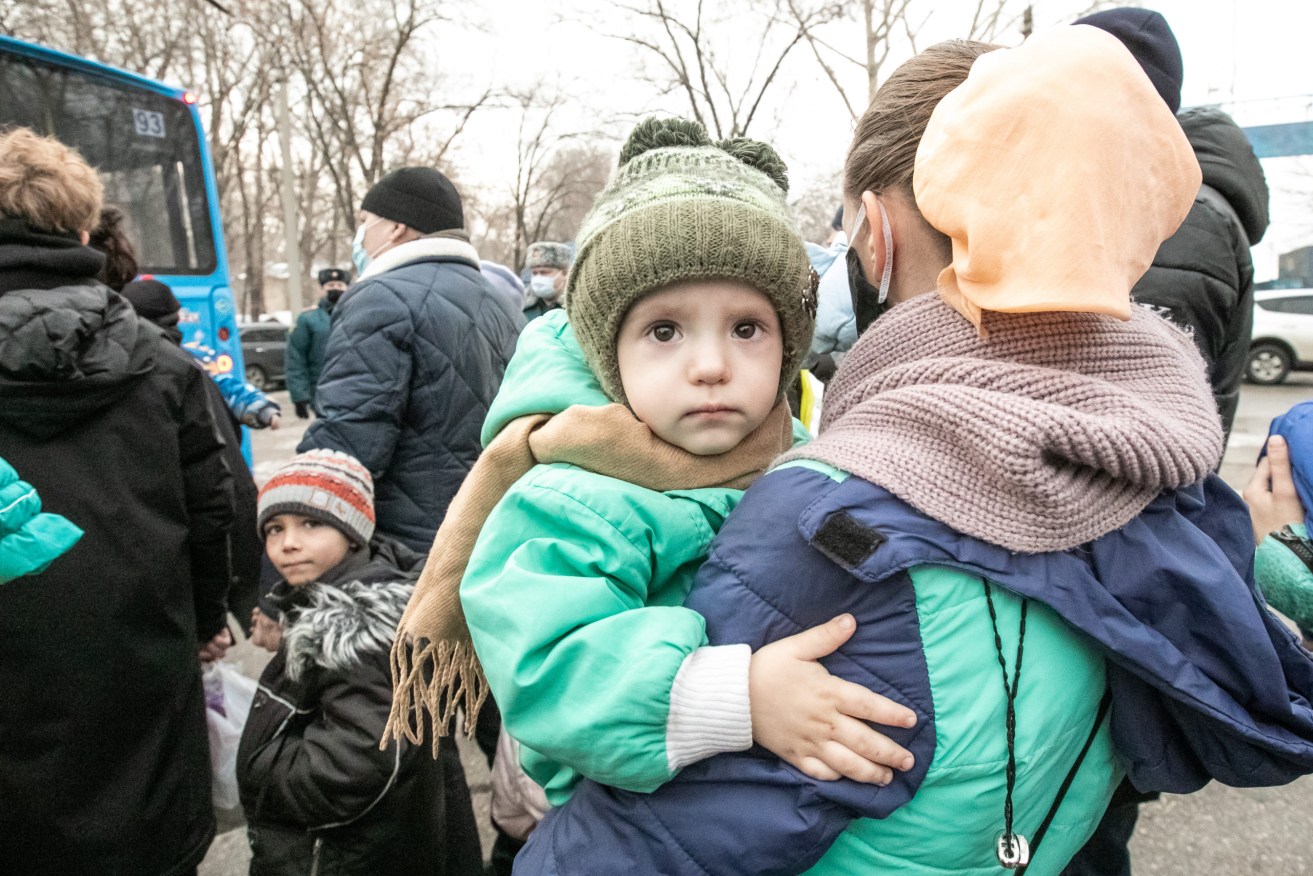Australia weighs up Russia sanctions over Ukraine
Prime Minister Scott Morrison will convene cabinet’s national security committee as Western nations begin to impose the first tranche of sanctions against Russia, despite a claim they are ineffective.

Civilians in the Donbass separatist region of Ukraine are evacuated. Hundreds have gone to Russia after Russian president Vladmir Putin recognised Ukraine separatist regions as independent and ordered soldiers in as 'peacekeepers'. Photo: Sandimirov/TASS/Sipa USA
Sanctions by the United States and United Kingdom will target Russian billionaires and financial institutions while Germany put the brakes on a new gas pipeline.
The committee is expected to finalise what targeted sanctions and measures Australia will introduce.
International security and intelligence professor John Blaxland said Australia would look to support European and NATO action “without overstepping the mark”.
“I’m a little bit worried that this may once again become a political football and we need to be very, very cautious at this point,” he told the Nine Network.
Australia has ruled out direct military assistance and is supporting Ukraine’s cyber-capability. It has left the door open for technical military support but the prime minister declined to elaborate on what the term meant.
Home Affairs Minister Karen Andrews has met her Five Eyes counterparts on Ukraine
“We’ll be considering sanctions and the extent of those and in the days to follow,” she told radio 4BC.
Andrews said there were concerns about a potential cyber attack on Australian critical infrastructure.
“That doesn’t mean we will go lightly in our response to Russia because this behaviour needs to be called out,” she said.
The head of the Ukrainian embassy in Canberra, Volodymyr Shalkivskyi, urged Western nations to be unified in their sanctions.
“We need Australia to join its partners in applying additional sanctions against Russia, and we also hope that the Australian government will provide additional assistance,” he told Sky News.
“Sanctions have to be targeted in the most vulnerable areas of the Russian economy, and everyone knows the most sacred areas of the Russian economy is energy.”
But Shalkivskyi said even if Ukraine announced it would no longer join NATO, there would still be Russian aggression in the region.
“It would not change anything because it’s not about NATO it’s about the independence of Ukraine … (Putin) questions our right to be independent,” he said.
“Even if we refuse or put out the agenda of NATO membership, the simple factor of the independence of Ukraine will be an irritation for the Kremlin for years to come.”
Foreign Minister Marise Payne said Australia was reviewing options relating to Ukraine’s pro-Russia breakaway regions Donetsk and Luhansk, and an announcement would be made as soon as possible.
Russia’s parliament approved treaties with the two regions a day after President Vladimir Putin recognised their independence.
“We will use whatever tools we have available to us to the greatest degree to ensure that we are applying sanctions in conjunction with our counterparts,” Payne said.
She also reserved the right to summon or expel the Russian ambassador but said the focus remained on targeted sanctions.
“As to how we deal with diplomats, that’s a matter I’ll turn my mind to at an appropriate time,” she said.
Opposition Leader Anthony Albanese said Western countries needed to be united with sanctions against Russia and that Australia had to join in implementing them.
“For it to be effective, it has got to be as wide, with as broad participation as possible,” he told reporters in Tasmania.
“The Australian government must join this action, the west must stand united, democratic nations need to call this out for what it is.
“This isn’t a peacekeeping force, but a peace-breaking force into sovereign areas of Ukraine.”
However, former British ambassador to Russia Anthony Brenton told the ABC previous economic sanctions have had little effect against the country, only knocking off around 0.2 per cent of GDP each year.
“They have certainly not been effective … and while they’ve had little economic effect they have had zero policy effect,” he said.
“The Russians gather around their president when pressure from outside is coming at them and they’ve been pretty tough in their refusal to bend to Western economic pressure. I would expect exactly the same in the upcoming round of sanctions now.”
-AAP




